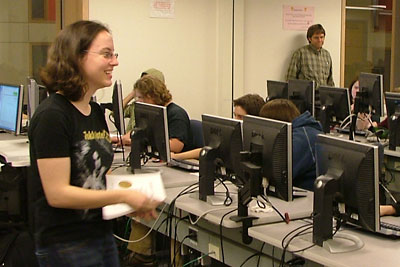Computer games (and pizza) help build K-12 computer skills
By Bill Steele

Computer science is "hard" and a little geeky. But computer games are fun and extremely cool.
So Cornell computer science students are using games to attract public school students to computer science. Last fall, 25 Ithaca-area middle and high school students learned how to make their own games, picking up some new computer skills in the bargain, in a free after-school program on the Cornell campus. Students were recruited through partners around Ithaca, including the Learning Web and Cornell Cooperative Extension. The class met every Tuesday afternoon in a computer lab in Phillips Hall. Sessions often combined programming and pizza.
A new session will be held in fall 2009, and there may be an advanced section for students from the first group.
The course was designed and taught by Cornell student members of the Game Design Initiative at Cornell (GDIAC). "We had several sixth-graders and up to a 12th-grader," said Chelsea Howe '09, who helped design the curriculum and became lead teacher. "The sixth-graders were some of our best programmers, and at the end had some of the best games."
In one of those games, called "Bob's Adventure," the protagonist is chased through Antarctica while fending off enemies by throwing fish at them. An all-girl team reflected current social attitudes in a game about getting a job and moving up in a company. "We helped with the programming, because most of the girls wanted to work on design," Howe said.
In the after-school program, as in Cornell undergraduate courses in game design, games are developed by teams to pool skills in programming, music and art. Students in the program began with simple graphics programming, learned how to storyboard and moved on to working with a free program called Game Maker, chosen because it is "very visual and doesn't require programming experience," Howe said. At the end of the semester, students took home CDs with all the games created by the class.
Students brought a variety of skill levels. "Some already knew the game software; some were just learning to use a mouse," said Walker White, director of GDIAC. Odd as the latter might seem, it can happen when a child comes from a family that does not have a computer at home, or where the child is not allowed to use the computer, White explained. "They're not walking away ready to design games, but often their computer skills were improved," he said. Technology, he added, is a good motivator for students and supports students with different learning styles.
Others on the curriculum planning committee were Sarah Brown '09, Joyce Lee '09 and Elliot Pinkus '08. Brown and Cooper Findley '12 helped teach the class.
The project is funded as an offshoot of a three-year National Science Foundation grant to Cornell computer science researchers to develop new databasing methods for -- among other applications -- computer games.
Media Contact
Get Cornell news delivered right to your inbox.
Subscribe